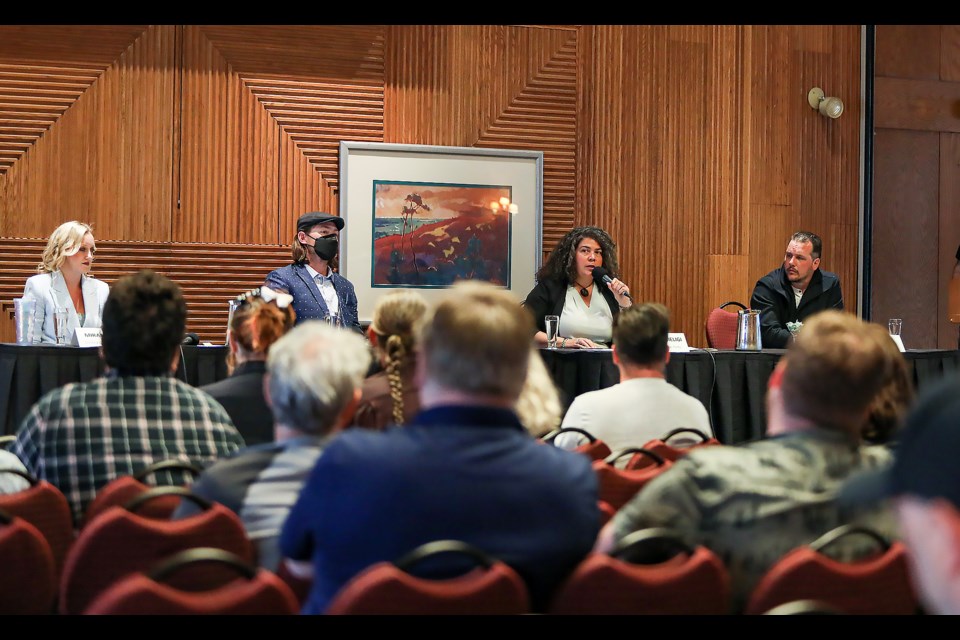Health care, including mental health and addictions, emerged as a top topic at an all-candidates’ forum in the Banff-Kananaskis riding earlier this week ahead of the May 29 provincial election.
Solidarity Movement candidate Kyle Jubb and the Green Party’s Regan Boychuk were on hand at the forum, held Tuesday, May 16 at the Banff Park Lodge hosted by Banff and Lake Louise Hospitality Association. But most of the debate and discussion was between the two main party candidates – UCP incumbent Miranda Rosin and NDP candidate Sarah Elmeligi.
With doctor shortages making it hard for many in the Bow Valley to access family physicians, temporary closure of labour and delivery at Canmore Hospital due to lack of staffing earlier this year and spikes in addictions and mental health, the candidates pitched their parties’ health-care plans.
Elmeligi said the NDP would introduce family health teams clinics, a plan that would help people see a family doctor within a day or two when they need medical attention, therefore freeing up space and long lines in the ER and hospitals.
The plan calls for the opening of 10 new family health clinics across the province, including one in the Bow Valley, giving people access to doctors, nurses, mental health therapists, pharmacists, social workers, dieticians, community paramedics, physiotherapists, midwives, speech pathologists and more.
Elmeligi said the clinics would be a “one-stop shop” for medical needs before people get too sick and end up in hospital.
“We’ve committed to building 10 brand new family health teams clinics around Alberta and one of those clinics will be coming here to the Bow Valley, and this is a direct way that our medical capacity here in the Bow Valley will be improved,” she said.
“These family health teams will be working with local health professionals, doctors and nurses, to first understand what the community gaps are in terms of the health professionals, and I think mental health always runs to the top right now.”
Seeking re-election in Banff-Kananaskis, Rosin said mental health and addictions are a top priority for the UCP, especially coming out of the COVID-19 pandemic, when so many people of all ages felt isolated.
“We’ve been there by their side trying to help them every step of the way, increasing funding and supports for mental health, I believe by almost 200 per cent in the last budget, just realizing how significant the gaps in needs were emerging in the past couple of years were,” said Rosin.
Last Monday, UCP Leader Danielle Smith announced the United Conservatives would introduce a bill pushing people with severe drug addiction into treatment, noting the legislation aims to balance the rights of the public with responsibility to help those in distress.
The UCP says it would also create more than 700 addiction treatment beds in 11 locations, including on First Nations. There would also be five new 75-bed mental-wellness centres.
The UCP also says the government has added 10,000 treatment spaces to provide detox and recovery services for up to 29,000 Albertans every year.
“Our government has a huge belief that recovery is absolutely possible … for the first time in Alberta history we’ve actually dropped all user fees to access public addictions treatment beds,” said Rosin during the election forum.
“In so many other jurisdictions around the world – some of the worst I would say are British Columbia or California – we see policy that really promotes this idea that addiction recovery is not possible, and that we should keep people down with their addictions, let them struggle and just support them in the life that they've chosen,” she added.
“But the reality is, the vast majority of people if they have opportunity to get clean that they would love to get clean. We believe humans and all Albertans are able and capable of getting clean if we are able to provide them with the resources and the avenues to do that, and that’s why we have supported recovery.”
Elmeligi said the NDP wants to take e a comprehensive approach with a range of treatment options for people with addictions, spanning everything from treatment beds through to housing through to mental health counselling.
“We are proposing integrated teams of police, social workers, mental health professionals and addictions counsellors to be working in our communities, and these would be interdisciplinary teams of professionals helping people identify what they need to recover their addictions,” she said.
“We really want to create a model that was really flexible to address peoples' needs. If that requires safe injection sites, that requires safe injection sites, but I think the idea is that we create a model that is flexible that serves whatever peoples' needs are.”




